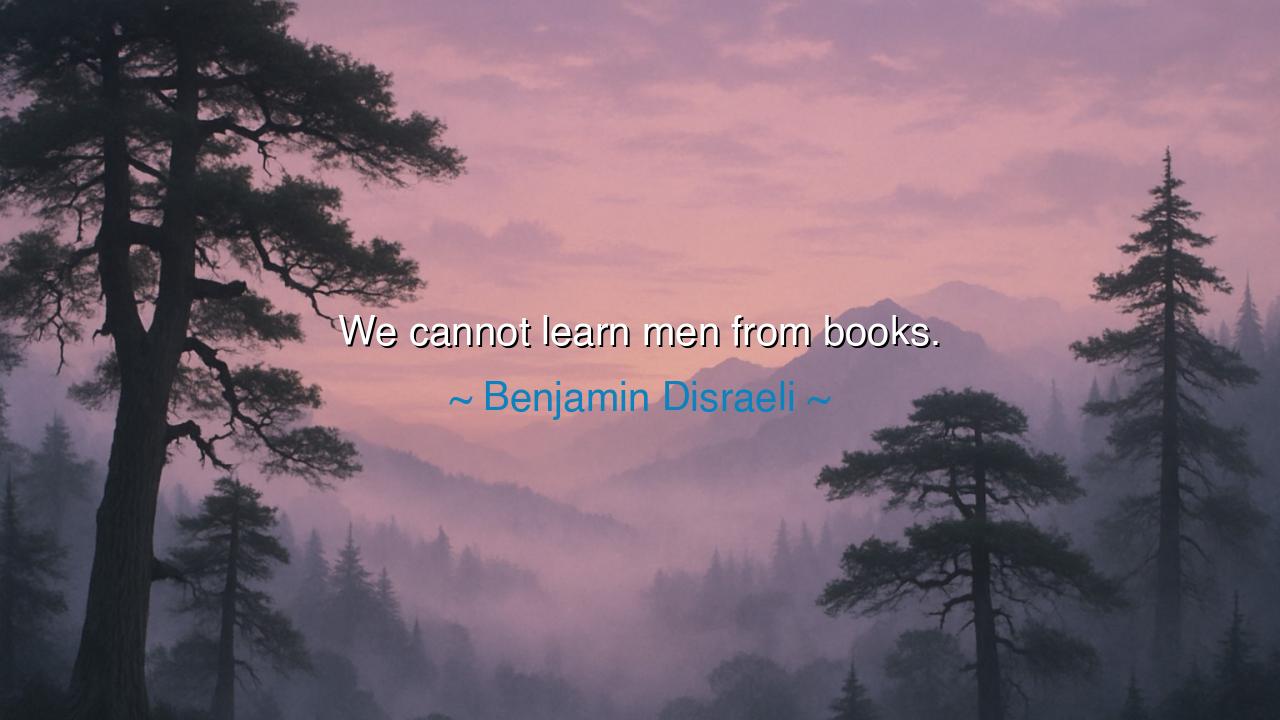
We cannot learn men from books.






In the words of Benjamin Disraeli, the statesman and sage, there rings a truth that echoes through the corridors of time: “We cannot learn men from books.” These words, simple yet profound, speak not against knowledge, but against the illusion that knowledge alone can unveil the mysteries of the human heart. For though books may teach us the patterns of history, the theories of mind, and the philosophies of virtue, only life—raw, unpredictable, and burning with contradiction—can teach us men. To study humanity through parchment alone is to learn the ocean by gazing upon a map.
In the ancient world, wisdom was never confined to scrolls or scripts. The philosophers of Greece, the poets of China, and the prophets of Israel all knew that truth must be lived to be understood. Disraeli, a man who rose from obscurity to power through the labyrinth of politics, learned not from classrooms but from the tumult of human ambition. In the debates of Parliament, in the shifting loyalties of his peers, in the silent betrayals and unexpected mercies of those around him—there he studied the soul of man. For books reveal thoughts, but life reveals hearts; and hearts are the true battlegrounds of destiny.
Think of Socrates, who wrote no book, yet whose wisdom transformed the world. He walked among the people, questioning them, observing the pride of the wealthy and the humility of the poor. He learned that a man’s nature cannot be summarized in theories, for every soul hides both light and shadow. A scholar might read of justice, but only by standing before injustice does he grasp its meaning. One may memorize the words “courage” and “compassion,” yet until one faces fear or forgives betrayal, these words remain hollow echoes. Thus, Disraeli’s declaration is not disdain for learning, but a call to living wisdom—to go beyond the printed word and enter the living story of mankind.
Books are like mirrors—they reflect, but they cannot breathe. They can describe the motions of love, but they cannot make the heart ache; they can define virtue, but they cannot teach one to act with it in the face of temptation. Disraeli, who served amidst the intrigues of empire, knew that the measure of a man lies not in what he reads, but in what he does when tested. The student who reads of courage may think himself brave, but the soldier who trembles in the storm of war learns the truth of courage with blood and sweat. So too in friendship, leadership, and love—the living world is the greatest of all classrooms, and every human encounter is a lesson waiting to be learned.
The Roman general Julius Caesar understood this well. He read the histories of great commanders, yet his greatness was forged not from their words, but from his own encounters with the hearts of men—his soldiers, his rivals, his friends turned foes. He learned to read men’s eyes, their silences, their ambitions hidden behind polite smiles. That knowledge was not found in scrolls, but in experience—the living language of human nature. He understood that to lead men, one must first understand them, and to understand them, one must walk among them.
So, my listener, take this wisdom to heart: do not mistake reading for knowing. Let books be your compass, but let life be your voyage. Read the words of the wise, but also read the eyes of those around you—the weary eyes of a laborer, the guarded eyes of the proud, the kind eyes of one who forgives. For every person is a living volume, written not in ink, but in experience, and it is through them that we learn what no author can ever fully convey.
The lesson is this: knowledge without understanding is like light without warmth. You may illuminate the mind, yet leave the soul untouched. To truly know men, you must walk beside them—listen, observe, suffer, forgive, and love. For in the depths of human imperfection, you will find the reflections of your own, and from that shared frailty will rise true wisdom.
And when you have read enough of life—when you have listened more than spoken, understood more than judged—you will know what Disraeli meant. That books teach the mind, but life teaches the soul. Seek not to master the pages of man, but the heart of mankind. Then, and only then, will you become both scholar and sage.






AAdministratorAdministrator
Welcome, honored guests. Please leave a comment, we will respond soon